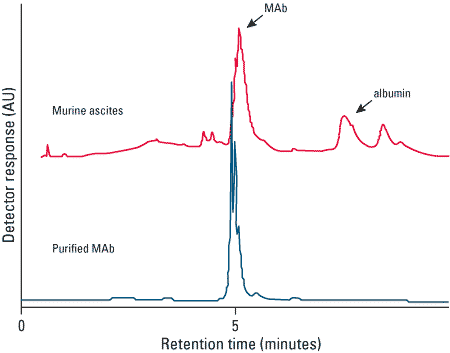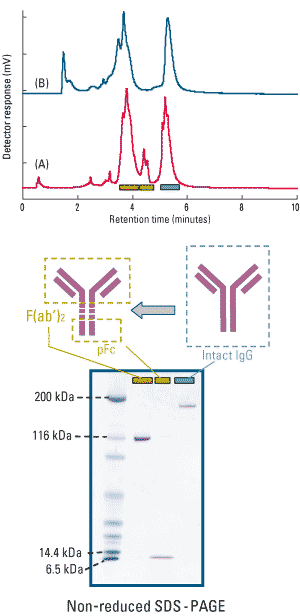TSKgel Q-STAT
TSKgel Q-STAT columns are packed with 7 and 10 µm non-porous polymer particles of which the surface consists of long hydrophilic chains of open access network of multi-layered quaternary ammonium anion exchange groups. The innovative bonding chemistry, combined with a relatively large particle size, results in a respectable loading capacity and a low operating pressure, making these columns suitable for all HPLC and FPLC systems.
Applications for the TSKgel Q-STAT columns include the separation of proteins, peptides, low molecular weight nucleic acids, aggregates and charge isomers of monoclonal antibodies, PEGylated proteins, oligo DNA, and siRNA.
Separation of mouse ascites fluid containing monoclonal antibodies and purified monoclonal antibodies |
 |
Column: TSKgel Q-STAT, 7 µm, 4.6 mm ID × 10 cm
Mobile phase: A: 20 mmol/L Tris-HCl buffer, pH 8.5
B: 0.5 mol/L NaCl in 20 mmol/L Tris-HCl buffer, pH 8.5
Gradient: A to B linear gradient (10 min)
Flow rate: 1.0 mL/min
Detection: UV @ 280 nm
Temperature: 25 °C
Injection vol.: 10 µL
Sample: Top: 1/10 dilution of mouse ascites containing mAb
Bottom: purified mouse mAb
Sample diluted 10-fold with eluent A |
Analysis of lgG |
 |
Columns: A: TSKgel Q-STAT, 7 µm, 4.6 mm ID × 10 cm
B: ProPac® WAX-10, 10 µm, 4 mm ID × 25 cm
Mobile phase: A: 20 mmol/L Tris-HCl, pH 8.5
B: 0.5 mol/L NaCl in buffer A
Gradient: 0 min (0%B) 10 min (100%B)
Flow rate: 1.0 mL/min
Detection: UV @ 280 nm
Sample: pepsin digested mAb |